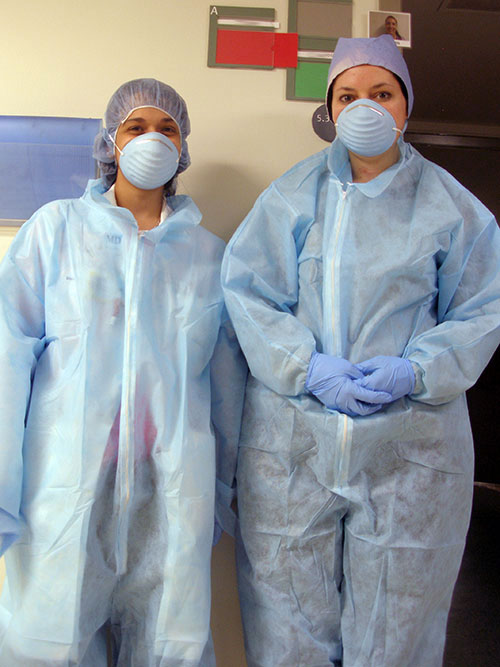Curriculum
1st Year
 During this time you will be acclimated to the University of Rochester, Strong Memorial Hospital. Your first year will consist of the following:
During this time you will be acclimated to the University of Rochester, Strong Memorial Hospital. Your first year will consist of the following:
- 4 weeks: Clinical Microbiology and Orientation
- 36 weeks: Inpatient ID Service
- 8 weeks: Clinical Outpatient, STI clinic, PK/PD, Antimicrobial Stewardship, Research
- 4 weeks: Vacation
The Inpatient Service consists of one to two ID fellows on a team, consisting of two separate teams. One fellow will be the on-call fellow for the day, in which consults are called in and distributed equally amongst the fellows. Weekend call is divided equally throughout the year amongst the fellows. While you are on the inpatient service, you will also have one half-day in the morning dedicated for your HIV Clinic day.
On your non-HIV mornings, you may be expected to see one General ID Hospital follow-up in the ID Clinic
The Outpatient service consists of eight weeks of training, during this time you will see new general ID outpatient consults; become proficient in dosing IV antibiotics through the inpatient antimicrobial stewardship program, diagnose and treat STDs at the Monroe County STD clinic. During your research time you will have familiarized yourself with our faculty, and be able to find a basic, clinical, translational and epidemiological research project which you will be able to build for your second year.
2nd Year
This is the year in which you will model your future career practice. You will have 8-10 weeks of inpatient service, along with your HIV clinic day. However, a vast majority of your time will be dedicated to your specific interest in infectious disease. For those who are interested in pursuing a clinical tract of infectious disease, you can elect to further your training in the outpatient setting, with the General ID Clinic, HIV/AIDS Clinic, Travel Medicine, or STD Clinic, or the inpatient setting, either with the General ID or Transplant ID services. If you are deciding to pursue a research oriented tract you can dedicate your time to the research laboratory of your choice.
3rd year (optional)
This is an option if you need to continue with your research that you started in your first two years. Other opportunities include obtaining advanced education degrees including a Masters in Public Health or Masters of Business Administration
We provide an optional, fully-funded 3rd year for those interested in furthering their research careers as physician scientist or to the pursuit of specialized training in Transplant Infectious Diseases or Global Health. Fellows may select this option during their recruitment or at any during their fellowship training.
Our transplant infectious diseases tract offers specialized training in both solid organ transplant and hematologic malignancies from dedicated faculty members. Our global health option includes mentored projects in Uganda as well opportunities within other divisions in Central/South America and Asia.
Other opportunities include obtaining advanced degrees including a Master in Public Health or Masters of Business Administration.
ID Clinic
Our outpatient Infectious Disease Clinic consists of a dedicated HIV/AIDS clinic, General Infectious Disease Clinic, Transplant/Oncology Clinic, and an LVAD Clinic. As the direction of healthcare is guided towards outpatient care, our Infectious Disease clinic provides our fellows with resources that will be crucial to their further careers. Our Clinic has an outpatient pharmacist, with a dedicated Outpatient Antimicrobial Parenteral Therapy Program, which is becoming standard of care in Infectious Disease practices worldwide. As a fellow, you will learn how to manage outpatient IV antibiotics, anti-retroviral therapy, anti-fungal therapy and complications related to transplant.